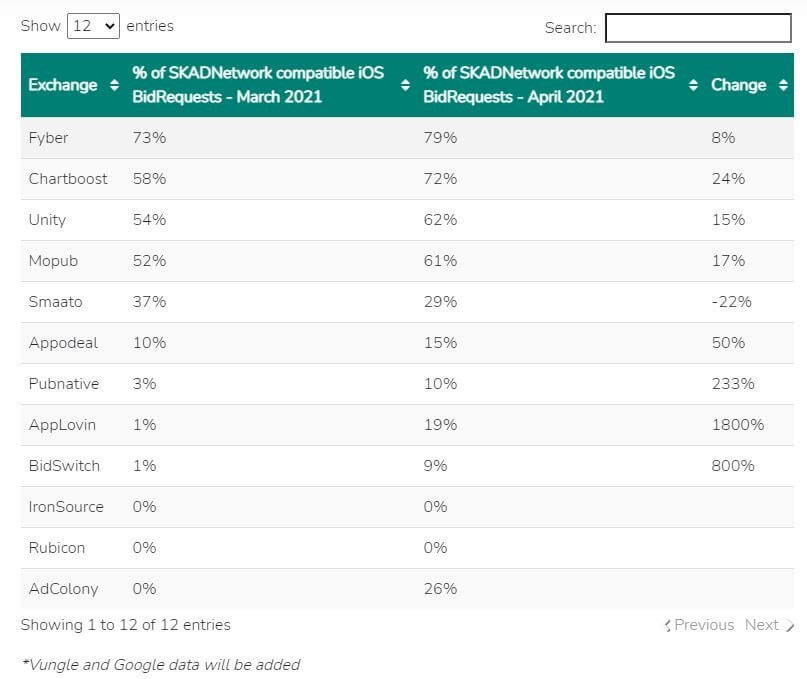

Roqad has been talking about “the IDFA apocalypse” for a while now. Some folks thought that Apple’s delay of rollout of the AppTrackingTransparency (ATT) framework upending whole ad and marketing industries, or maybe that Apple decided to start talking to and listening to ad industry people, but it never really happened.
And so it goes.
So the IDFA apocalypse is real and it’s here!
The latest “announcement” from Apple targeted the week of April 26 as the rollout date of iOS14.5, and they were true to their obfuscated word. Publishers, DSPs, SSPs, DMPs are finally face to face with the mass scale loss of data that we’ve been expecting. It’ll be a few days before we see the real results of the change, but you can see the trend already – Apple’s SKAdnetwork is an “alternative” platform no longer!

Apple has been quietly working on their own alternative advertising platform — the SKAdNetwork, which at the time of this writing offers rudimentary tracking measures. At best, it’s a huge step back for ecosystems that depend on attribution data. For some sectors, it’s a total loss of visibility.
TL; DR: the good news is that you can recover some identity resolution functionality with tools offered by a few firms, Roqad being one of them).
How did we get here? Here is some background info!
In this article we will cover:
What is an IDFA?
IDFA (Identifier for Advertisers) is a unique identifier for mobile devices and is used to target and measure the effectiveness of advertising on a user level across mobile devices.
So What Is an IDFA Apocalypse?
Apple didn’t just up and eliminate IDFA.
Instead, it is giving users an option to opt-out of it.
With iOS 14.5, the new operating system for iPhones and iPads, Apple made a change where every iPhone app has to ask the user upfront, and an answer is required, whether it’s OK to share their data with 3rd parties. If users opt out, then advertisers will lose access to IDFA data and their ability to track users when they download games or make in-app purchases.
So why the talk of apocalypse?
The vast majority of users are expected to opt-out. The opt-in rates are estimated to be low, perhaps around 20% or 40%. This is the massive data loss, the “apocalypse” part. Apple’s is developing its own proprietary, alternative ad performance tracking system, but the functionality is relatively primitive to what is available today (more about that later). Most marketers and publishers will instantly lose vision of and insight about their iOS customers. For example, it is estimated that the change will cost game developers 40% of their revenue, or approximately $15 billion.
From Apple’s announcement:
Starting with iOS 14.5, iPadOS 14.5, and tvOS 14.5, you’ll need to receive the user’s permission through the AppTrackingTransparency framework to track them or access their device’s advertising identifier. Tracking refers to the act of linking user or device data collected from your app with user or device data collected from other companies’ apps, websites, or offline properties for targeted advertising or advertising measurement purposes. Tracking also refers to sharing user or device data with data brokers
On a side note, it’s kind of bizarre that such a simple change can upend whole industries.
Apple wants to prevent advertisers from creating alternate identifiers too. From their FAQ:
If I have not received permission from a user via the tracking permission prompt, can I use an identifier other than the IDFA (for example, a hashed email address or hashed phone number) to track that user?
No. You will need to receive the user’s permission through the AppTrackingTransparency framework to track that user.
What Is the SKAdnetwork?
SKAdNetwork is an aggregate method for measuring attribution of mobile ad campaigns for iOS apps. The SK stands for StoreKit, which is Apple’s framework for developers to interact with the app store and in-app purchases.
The SKAdNetwork framework is not new, as Apple introduced it back in March of 2018. It was originally positioned as an alternative, more privacy-oriented approach to campaign measurement.
Since independent and unbiased attribution solutions were already very robust and widely used by advertisers even back in 2018, there was no major incentive for advertisers to adopt SKAdNetwork at the time, especially since these solutions could deliver attribution for all networks and operating systems, not just for iOS alone.
Apple’s SKAdNetwork remained on the sidelines of the mobile attribution and marketing measurement playing field for over two years. Well, SKAdnetwork will remain on the sidelines no more.
SKAdnetwork is a class that validates advertisement-driven app installations. In short, the SKADNetwork is Apple’s way to attribute impressions and clicks to app installs on iOS apps. It shares conversion data with advertisers without revealing any user-level or device-level data.
The framework involves three main entities:
- The ad network signing the ad
- The publishing app (where the ad is displayed)
- The app being advertised
Here is the functionality that you don’t get with the SKAdNetwork:
- Basic features like view-through and click-through attribution
- Advanced features like deferred deeplinking and long cohorts
- Real-time data – notifications are sent to the network after 24 to 48 hours
- User-level data
- Data on smaller campaigns or publishers (threshold TBD)
Ouch.
Don’t get us wrong, we love some of Apple’s statements about promoting user privacy. Roqad is committed to promoting user privacy too, in fact we were an early adopter of the Transparency and Consent Framework. In fact, our Vendor ID number is 4 — proof that we saw the value of this project early on. It aligns with Roqad’s values, especially “Privacy by Design,” which we bake into our product.
Basic identity resolution and retargeting functionality is going away, but Roqad can help you recover your vision and insight.
IDFA is going away fast, but your customer relationships don’t have to go with it
With news of the recent Apple iOS 14.5 App Tracking Transparency update, learn how our identity graph can help marketers and mobile publishers maintain their relationships with consumers. We view Apple’s IDFA shift (and Google’s deprecation of third-party cookies) as a strategic advantage for Roqad, and as the big guys continue to make it harder to understand the identity of users outside of their respective platforms, we will actually see increasing advantage. We have been preparing for the shift for some time.
Reach out if you want to discuss and learn how our identity resolution products can help marketers and mobile publishers maintain their relationships with users in the post-IDFA world.